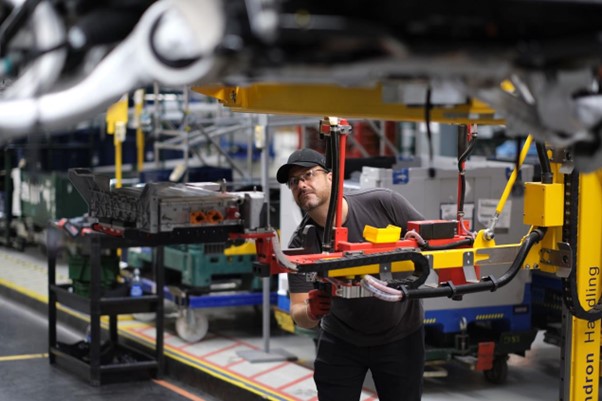UK automotive and the fleet and leasing sector have welcomed the Government’s Industrial Strategy and pledged to build on its foundations.
Published yesterday (Monday, June 23), the new Industrial Strategy sets out a 10-year plan to boost investment and business in the UK.
Speaking at the industry’s annual Summit in London today, Mike Hawes, chief executive of the Society of Motor Manufacturers and Traders (SMMT), said: “Government’s long-term Industrial Strategy, including the Drive35 £2.5 billion auto capital and R&D fund, recognises automotive as a pillar of advanced manufacturing, integral to the world leading innovation that creates the high value jobs, wealth and economic growth that are vital to our country’s future.
“Now we must make the most of that position and put in place the right conditions for growth.”
Toby Poston, chief executive of the British Vehicle Rental and Leasing Association (BVRLA), believes the strategy shows that the Government is “prioritising and investing heavily” in UK automotive.
“It has big ambitions and serious plans for ensuring that this country has a long-term future in developing and manufacturing zero emission, software-defined and autonomous vehicles,” he wrote on LinkedIn.
Elsewhere in the strategy, he said that there were “tantalisingly vague references” to the fleets that operate and finance these vehicles.
He added: “The focus on speeding-up grid connections will be welcomed by many as will plans to cut regulatory costs by 25% this parliament (although the words ‘stable’, ‘horse’ and ‘bolted’ come to mind a bit here…).
“It was also welcome to see the Government acknowledge the vital role played by tax incentives, where it cited full expensing and benefit-in-kind (BIK) rates. The key thing now is to widen their impact.”
Poston says that full expensing could be transformative in making electric commercial vehicles more rentable, while 0% BIK for used EVs would provide essential relief to a “beleaguered” second-hand market.
“Most eyes are now focused on the £1.8bn of new support outlined for electric vehicles and charging infrastructure in the recent Spending Review,” he added.
New report includes key asks from industry
The strategy comes as a new SMMT report, The Competitive Edge: Driving Long-Term UK Automotive Growth, plots a pathway for the sector’s success.
It features SMMT’s first UK Automotive Business Leaders Barometer, which charts the industry’s strengths and potential, with more than half of businesses having recently secured, or planning for, investment.
But it also reveals low confidence in global trading conditions and doubts about the ability to meet net zero ambitions, amid rising costs and falling profitability.
Almost three quarters (73.5%) of the CEOs surveyed said their business costs had increased in the last year, with 46.9% reporting falling profits.
The sector also faces some of the world’s toughest market regulation and compliance costs – factors which must be addressed urgently to create a level playing field that anchors existing investors and creates the right conditions for further growth, says the SMMT.
UK automotive manufacturers pay more for electricity than anywhere else in Europe – more than double the average – due in part to energy taxes six times higher, which added over £200m to manufacturers’ bills last year alone.
Rapid implementation of the reforms to industrial energy costs, set out in the Industrial Strategy, would cut the sector’s electricity bill by a fifth, helping ease this structural disadvantage, the SMMT argues.
However, to level the playing field, it says the proposed relief on standing charges – which will apply to battery manufacturing – should also benefit automotive manufacturing, given the sector will become more electricity-dependent as it increasingly builds EVs.
£6.5bn in electric vehicle discounts

Manufacturers have also provided £6.5bn in electric vehicle discounts over the past 18 months to shore up EV demand that remains stubbornly behind mandated Government targets, according to SMMT.
Meanwhile, more than half (52%) of CEOs believe the UK is significantly behind track to meet the 2030 end of sale date for new cars powered solely by combustion engines.
Demand has been further damaged by Governmental disincentives such as the VED expensive car supplement (ECS), estimated to impose an effective fine of more than £360m on EVs bought from April this year.
The SMMT is calling for bold Government action to drive up demand for the EVs which manufacturers are compelled to sell is essential, requiring a package of consumer support measures, including amendments to the ECS and cuts to VAT on new EVs and public charging. This would help deliver a vibrant domestic market which is not just a leader in decarbonisation but in affordability, it says.
Hawes concluded: “We welcome the Government’s Industrial Strategy, a 10-year plan which answers our call for a long-term commitment to automotive manufacturing.
“With action to reduce electricity costs, upskill workers and unlock finance, it lays the foundation on which we can build our future.
“We now need to see the strategy implemented and at pace, because competitors will move fast so our window of opportunity will not remain open for long.
“The prize, however, in terms of jobs, innovation and economic growth – green growth at that – is worth the investment.”
Competitive Edge: Driving Long-Term UK Automotive Growth sets a joint challenge to return the UK to the top 15 global automotive manufacturing locations by 2030, with 10 recommendations to deliver as part of an Industrial Strategy, as follows:
- Introduce transformative new support to supercharge the market, including a major purchase incentive scheme for consumers for the duration of the mandate, and maintenance and extension of support for harder to decarbonise segments.
- Publish a clear roadmap for bus, coach and heavy-duty vehicle decarbonisation co-developed with industry.
- Ensure everyone has a ‘right to charge’ by mandating delivery of public charging and refuelling infrastructure across the UK.
- Ensure the UK’s competitiveness prospectus and role of the Office for Investment to promote the UK’s offer is geared to support new and existing investors.
- Reduce the cost of energy and support manufacturers to remain internationally competitive.
- Provide step-change supply chain funding to de-risk private investment into competitiveness building activities.
- Follow through on the promise to allow 50% of the apprenticeship levy to be spent on non-apprentice training.
- Maximise and develop the EU-UK economic relationship to protect and grow the European automotive sector.
- Deliver on the foundations of the UK-US Economic Prosperity Deal to maximise automotive exports.
- Secure trade agreements with new and existing trading partners which place automotive at their core.























Login to comment
Comments
No comments have been made yet.